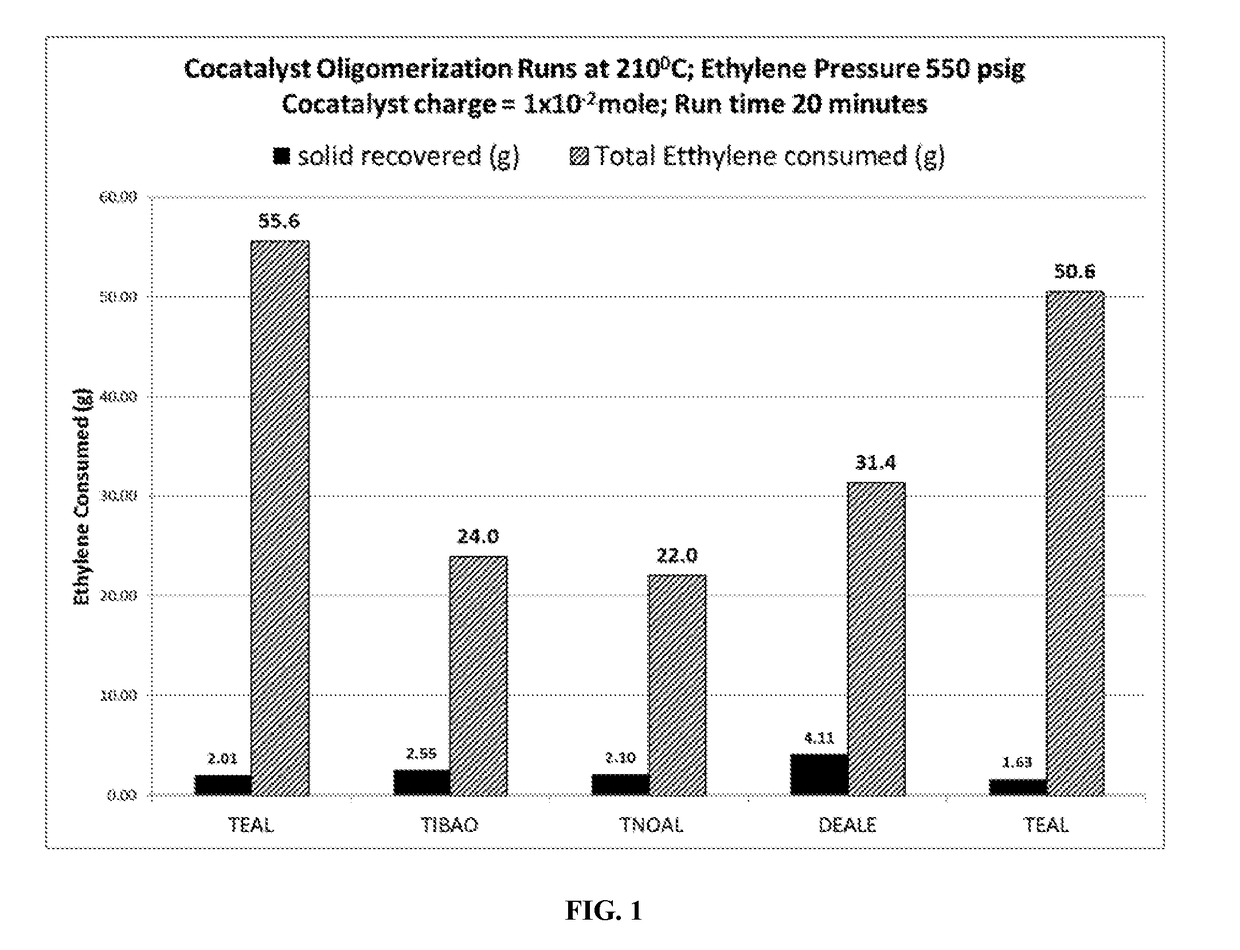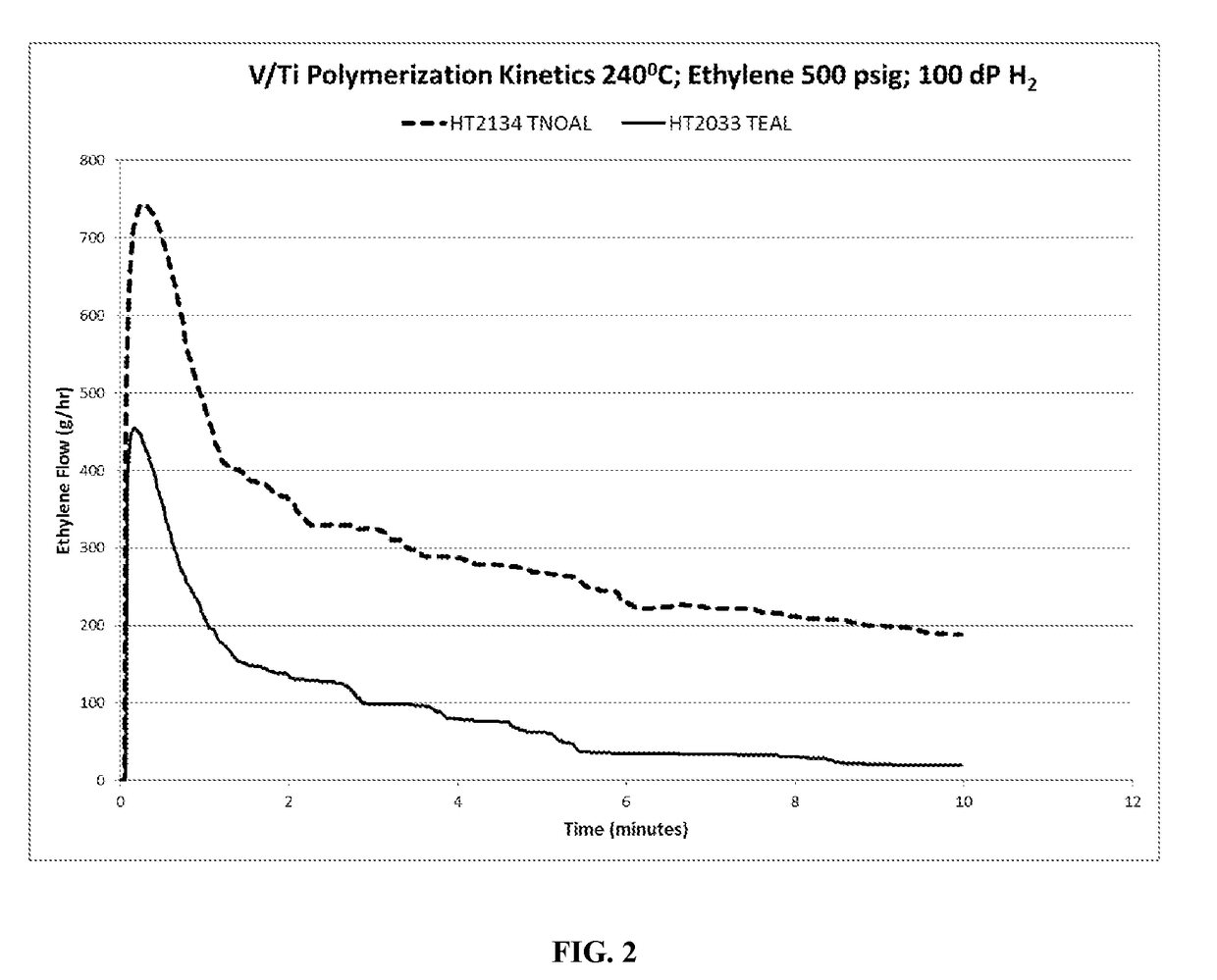Tri-n-octyl aluminum co-catalyst for higher density homopolymers for the solution process
- Summary
- Abstract
- Description
- Claims
- Application Information
AI Technical Summary
Benefits of technology
Problems solved by technology
Method used
Image
Examples
example 1
o-Catalyst Tests for Propensity to Form Oligomers at High Temperatures
[0051]A 4-liter reactor is purged with nitrogen (N2) gas to reduce impurities, and 1200 mL of Isopar™ H solvent is added. Hydrogen was added from a 75 ml addition vessel and accompanied by a 400 psig pressure drop. The reactor pressure was 550 psig. The reactor was then brought to 210° C. and the co-catalyst under test was injected. Upon injection of co-catalyst, a temperature rise was noted throughout the run, and was ethylene fed upon demand at 550 psi pressure.
[0052]After 20 minutes run time, the reaction was terminated by turning off the ethylene and rapidly discharging the reactor contents to a dump vessel. The contents of the dump vessel were cooled and collected by filtration. About 2-4 grams of solid material were collected. The ethylene mass flow meter indicated that between 10-30 grams of ethylene had been consumed, which would have been present in the reaction solvent. The co-catalyst runs in this examp...
example 2
rization Experiments with 1-Octene Using Vanadium Halide / Titanium Halide Catalyst System and Different Co-Catalysts
[0054]Polymerization experiments were conducted at 140° C. using a 4VOCl3 / TiCl4 catalyst combination, that is, vanadium oxytrichloride in combination with titanium tetrachloride, in a molar ratio of 4 moles (V) to 1 mole (Ti). The polymerization experiments were carried out in the same reactor as the oligomerization experiments described in Example 1. The co-catalyst is injected into the reactor and allowed to stir for 30 seconds, then the catalyst solution is added. The polymerization time starts when the catalyst is added and ends when the ethylene is shut off and the reactor is dumped to the discharge vessel. The following Table provides the polymerization test conditions, with reaction time for each experiment being 60 seconds, and properties of the resulting polymer.
TABLE 1H2, ΔPVol.Vol.smallRunMileageEx.CocatC2 =RunIsoparC8 =vesselTime(gPE / gHLMI / No.CatalystCat ccC...
example 3
merization Experiments Using Vanadium Halide / Titanium Halide Catalyst System and Different Co-Catalysts
[0057]Polymerization experiments were conducted with ethylene monomer only, using 4VOCl3 / TiCl4 catalyst combination, that is, in a molar ratio of 4 moles (V) to 1 mole (Ti). The polymerization experiments were carried out in the same reactor as the oligomerization experiments described in Example 1 and co-polymerization tests of Example 2, but were conducted at a polymerization temperature of 240° C. The following Table sets out the polymerization test parameters and components and polymerization results, with the polymerization reaction time for each experiment being 10 minutes.
TABLE 2H2, ΔPVol.Vol.smallRunMileageEx.CocatC2 =RunIsoparC8 =vesselTime(gPE / gNo.CatalystCat ccCocatccPressureT (° C.)H (cc)(cc)75 cc(sec)CAT)MI3AV Ti1.5TEAL5.4500240120001006004755.413BV Ti1.5TNOA5.750024012000100600144412.693CV Ti0.9TNOA3.450024012000100600168012.68
[0058]The following solution parameters a...
PUM
| Property | Measurement | Unit |
|---|---|---|
| Temperature | aaaaa | aaaaa |
| Temperature | aaaaa | aaaaa |
| Fraction | aaaaa | aaaaa |
Abstract
Description
Claims
Application Information
 Login to View More
Login to View More - R&D
- Intellectual Property
- Life Sciences
- Materials
- Tech Scout
- Unparalleled Data Quality
- Higher Quality Content
- 60% Fewer Hallucinations
Browse by: Latest US Patents, China's latest patents, Technical Efficacy Thesaurus, Application Domain, Technology Topic, Popular Technical Reports.
© 2025 PatSnap. All rights reserved.Legal|Privacy policy|Modern Slavery Act Transparency Statement|Sitemap|About US| Contact US: help@patsnap.com


